We do not have China debt problem: Umar
Minister says debt sustainability challenge is of our own making
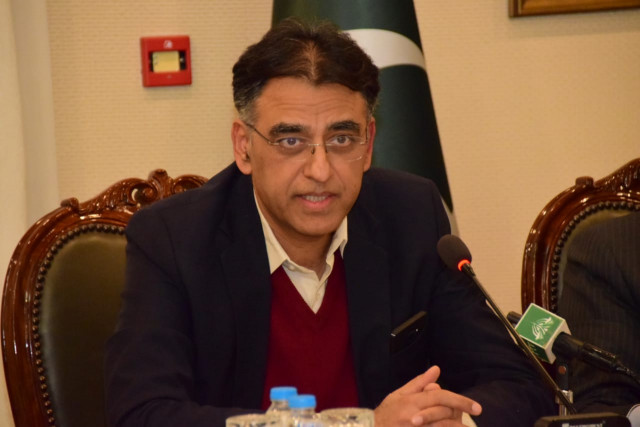
Federal Minister for Planning, Development and Special Initiatives Asad Umar on Wednesday said China was not responsible for Pakistan’s debt sustainability problems, insisting the issue was of our own making.
Addressing a news conference, the minister admitted that the country had a debt servicing and debt sustainability challenge but hastened to add that "we do not have a China debt problem". He was flanked by Special Assistant to the Prime Minister on CPEC Khalid Mansoor.
The minister was responding to four key issues raised by a US-based research lab, AidData. The research report had highlighted lack of transparency, imposition of secret loans on Pakistan, loans being expensive and Pakistan’s debt rising to a dangerous level because of CPEC.
Referring to some news reports published in the local media which quoted the US think-tank’s report that many information with regards to CPEC were being kept secret, the minister said each and every thing about the project was kept public.
“The government provided the information about the projects being executed under CPEC to the International Monetary Fund (IMF)”, the minister said and added, “The global lender did not raise any concerns about the CPEC loans.”
In December 2018, The Express Tribune had reported that according to the information shared by the PTI government with the IMF the country would return $40 billion to China in 20 years against $26.5 billion investment in the energy and infrastructure projects.
Umar said after sharing the CPEC information, the IMF never raised questions about the multi-billion dollar project as there was nothing to “hide”.
“Pakistan has been facing a debt sustainability challenge but the problem is our own making,” the minister admitted.
“We do not have a China debt problem, as China’s debt is only 26% of the total external debt of Pakistan,” said Umar while clearing China of Pakistan’s debt mess.
Read Talks begin to roll over $3b CPEC debt
The State Bank of Pakistan’s new debt bulletin showed that the PTI government has added another Rs1.1 trillion to the debt during the first two months of the fiscal year. The increase was far more than the budget deficit of less than Rs700 billion during this period.
The SBP report, released on Tuesday, showed that out of Rs1.1 trillion, Rs1 trillion had been added to the external debt – thanks to the rupee devaluation against the US dollar during this period.
Umar said that the CPEC loans for the private power projects were comparatively cheaper than the loans from other international agencies such as the World Bank, the Asian Development Bank and the other western financial institutions.
“The average interest rate of the CPEC energy project is 4% compared with 4.25% given by the World Bank, the Asian Development Bank and other western institutions,” he added.
”Chinese loans to power projects range from 3.3% to 4.75% while the western loans from 3% to 4.75%,” said Umar.
Read Govt dismisses reports CPEC facing delays
“If Pakistan’s debt was sustainable despite other 74% western financial institutions' loans, then how it can become unsustainable due to the Chinese loans,” Umar questioned.
To a question about the high rate of return on the investment being made by the Chinese investors, the minister said the “rate of return offered to Chinese is more than what should have been given and I had taken up the matter with Nepra”.
“After my petition, Nepra did not allow setting up subcritical technology power,” Umar said, adding, “But the authority stuck to its stance and did not change the rate of return offered to the Chinese.”
Umar said in addition to foreign lender agencies, the parliamentary standing committees were also taken on board regarding the CPEC projects. The CPEC projects' information was also available with the National Electric Power Regulatory Authority, he added.
He also brushed aside allegations of hidden debt under CPEC. “We tried to think about it and the only thing that comes to our mind: maybe they are calling sovereign guarantees for any loan or project as secret or hidden debt.”
The minister said that sovereign guarantees were provided to all independent power producers — whether domestic or foreign.
“The government of Pakistan gives sovereign guarantee to all the foreign-funded projects and all the Independent Power Producers (IPPs) whether they are from China, the US or any other country.”
He said a majority of infrastructure project loans were taken at a concessional rate of 2%.
Umar also denied that preferential treatment was being given to the Chinese investors, saying that the same conditions were devised and offered to the world for setting up power projects.
“Only Chinese investors come to set up power plants under the conditions,” he said.
SAPM on CPEC Khalid Mansoor said that setting up power plants on the Chinese financing was the only option available to the then PML-N government to end 12 to 18 hours loadshedding, as no financing was available from anywhere else.
Khalid said unlike western countries that do not allow procuring machinery from a third country in case of suppliers’ credit, China had allowed to buy the US-made General Electric machinery for HUBCO power plant.
To a question about the damage caused to CPEC by the PTI government’s own actions and statements, the minister said that he had already explained the progress on CPEC under the PTI regime.
Mansoor said when work on the Thar coal power project was initiated, no one other than China was ready to invest in the project. He said the mismanagement in the conditions of the projects was committed by the then Pakistan government that should not be linked to China.

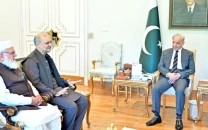

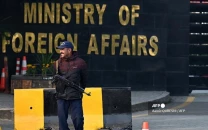





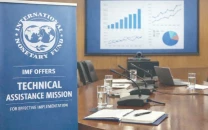
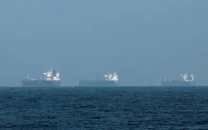








COMMENTS
Comments are moderated and generally will be posted if they are on-topic and not abusive.
For more information, please see our Comments FAQ